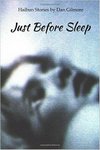|
KYSO Flash ™
Knock-Your-Socks-Off Art and Literature
|
|
|||
Just Before Sleep: Haibun Stories by Dan GilmoreReviewed by Duff Brenna
Gilmore’s collection is comprised of twenty-three “stories,” including five haibun. This reviewer is familiar with haiku, but having never heard of haibun, I found the form itself both surprising and appealing. Part prose poem, part flash fiction, with what one might call a “dangling haiku” (which may come first, or in the middle, but usually as an end stop), the haibun method offers itself to the writer’s powers of compression and his or her skillful handling of poetic rhythms. “A Smart Fly” gives an example of how deft Gilmore is at creating a story (or call it a poem if you will) that squeezes what might have been an entire page worth of prose into a short paragraph packed with concrete imagery, wherein each word carries weight which it passes on to the next word, the next sentence, subsection, flashback, fast-forward. The narrative concerns a snowstorm and a man in a cozy house eating a doughnut, while a fly is apparently banging its brains out on a window pane, as if attempting to trade the warmth of the kitchen for the certain chill and death of the weather outside. The man “remembers a few dumb decisions he made in his own life.” He associates his youthful actions with that of the stupid fly and decides “...it deserves to live with the consequences of its decision.” Raising the window and expecting the fly to rush out, the man is perplexed to see it circle back and descend triumphantly on the doughnut. So simple, succinct, funny, revealing. Yes, and wonderfully fly smart, too. Many of Gilmore’s stories have that same quality of surprising humor: A devout woman, a Bible thumper, who watches roller derbies and commands the players to “Kill her. Oh, kill her. Hit her in the mouth.” A man and woman drinking gin and discussing the fact that Netflix didn’t leave a DVD in the mailbox and the baseball game was rained out and the next movie was “...a story of a man in love with a woman’s breasts” and “...how many eggs can one woman have?” Whatever, let’s have another, a double this time. In a following story, Gilmore’s cat says, “Happy Birthday, Bob.” He tells us she tries so hard. “She’s such a perfectionist. I cannot bear to tell her my name is Dan.” Other stories are tender or bittersweet or jarring in their fatalistic candor. “After Your Stroke” demonstrates how little we can do for a loved one who is paralyzed. We can watch; we can smile; we can massage them, feed them if they can chew, give them water. “This is all I can do,” he tells us before leaving behind a symbolic haiku— a child with a wooden sword Hopelessness is also the theme of “Destiny” where we watch the narrator standing by his broken wife (out of “Habit maybe”). Staring out the window, he can see baby birds being pushed from the nest by their mother. It’s fly or die time. Two die, but miraculously the third “somehow manages to catch the air, flies away, and circles back to its nest.” A little uplift this reader appreciated. More haibun follow. Some of them are “up,” others are “down.” But all of them are interesting, and, more importantly, they’re ruthlessly honest and well worth your time. —With author’s permission, we first published this review on our Facebook page and on Amazon dot com. Duff BrennaIssue 4, Fall 2015
is the author of six novels, and recipient of an AWP Award for Best Novel (The Book of Mamie), a National Endowment for the Arts Award, a South Florida Sun-Sentinel Award for Favorite Book of the year (The Altar of the Body), a Milwaukee Magazine Best Short Story of the Year Award, a Pushcart Honorable Mention—and, most recently, a 2013 Indie Book Award in the Short Story category (Minnesota Memoirs). Brenna’s latest books include a memoir, Murdering the Mom (Wordcraft of Oregon, 2012), and a collection of short stories, Minnesota Memoirs (Serving House Books, 2012). His novel, The Holy Book of the Beard, which he says is one of his favorites, was re-released in 2010 (New American Press). A New York Times review of this book says, “It is loaded with all the ingredients of an underground classic...it is nearly impossible to put down.” His stories, poems, and essays have appeared in Cream City Review, SQ, Agni, The Nebraska Review, The Literary Review, The Madison Review, New Letters, and numerous other literary venues. His work has been translated into six languages. Brenna is Founding Editor of Serving House Journal, now in its sixth year of publication online. Web del Sol lists SHJ among its Top 50 Literary Journals. |
|
Site contains text, proprietary computer code, |
|
| ⚡ Many thanks for taking time to report broken links to: KYSOWebmaster [at] gmail [dot] com ⚡ | |
